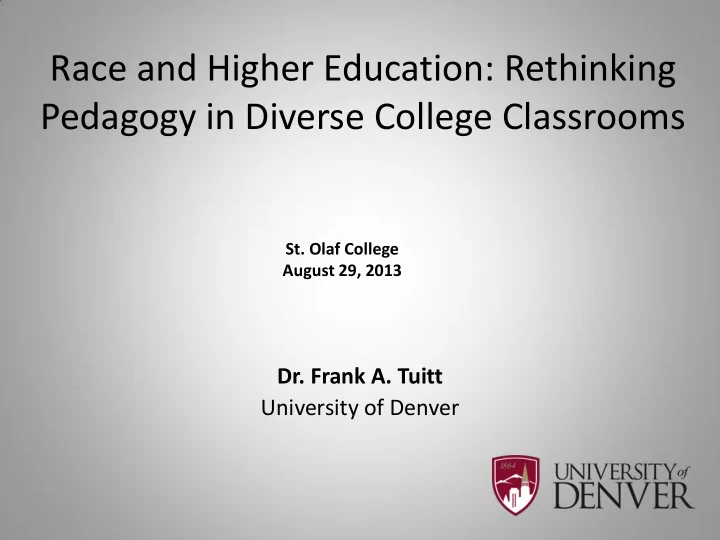

Race and Higher Education: Rethinking Pedagogy in Diverse College Classrooms St. Olaf College August 29, 2013 Dr. Frank A. Tuitt University of Denver
Presentation Overview • How might we rethink our pedagogy in increasingly diverse learning environments ? • How can we create learning environments that respect and care for the souls of our students?
Race and Higher Education Assumptions Race matters, Identity matters, Context matters. I am joining a conversation in progress with caring and concerned colleagues. Good intentions do not guarantee progressive results. Any individual perception is reality. Advancing inclusive excellence requires self-awareness, courage, and continuous commitment. Experts and tool kits are impractical – there ¡is ¡no ¡“one ¡ size ¡fits ¡all.” Creating inclusive classrooms is important for all disciplines. We will raise more questions than answers. We can always do better.
AAC&U’s ¡Making ¡Excellence ¡Inclusive • Presents higher education with a new framework for excellence that integrates diversity and inclusion as critical components of institutional excellence. • Requires higher education to re-envision diversity and inclusion as critical processes through which we create new forms and levels of excellence in teaching, research, learning, student development, workforce development, institutional functioning, and more. • “Making ¡excellence ¡inclusive ¡means ¡attending ¡both ¡to ¡ the demographic diversity of the student body and also to the need for nurturing climates and cultures so that all ¡students ¡have ¡a ¡chance ¡to ¡succeed” ¡(AAC&U, ¡2013).
Inclusive Pedagogy: Definition • The purposeful embodiment of inclusive pedagogical practices toward multiple student identity groups (Milem, 2007). • A focus on student intellectual and social development. Pedagogically, it means offering the best possible course of study for the context in which the education is offered. • The development and utilization of educational resources to enhance student learning.
Inclusive ¡Pedagogy… • Recognizes the cultural differences diverse learners bring to the educational experience and how those cultural differences enhance the teaching and learning environment. • Creates welcoming classroom environments that engage all of its diversity in the pursuit of individual and collaborative learning. • Establishes an environment that challenges each student to achieve academically at high levels and contribute to learning and knowledge development (AAC&U, 2005).
Why Promote Inclusive Excellence? • Disconnect between diversity and educational excellence • Demographic shifts on campus • Increasingly diverse cohorts of students • Shifting social policies and laws (e.g. Fisher, Dream Act, Hollingsworth et al. v. Perry/ DOMA) • Persistent social and educational inequities • Institutional history and legacy • Leveraging diversity has educational benefits
Benefits of Inclusive Excellence • Academic outcomes – Educational aspirations, self-confidence, critical thinking, & problem solving abilities. • Diversity outcomes – Enhances perspectives and experiences, improves cultural awareness, fosters creativity, & innovation. • Civic outcomes – Higher levels of civic engagement, creates informed citizens, strengthens commitment to equity, & justice.
Race in the Classroom: Challenges • Identity can complicate the teaching and learning environment. • Prior experiences with race and racism can inform classroom interactions. • Teaching to students with different levels of identity salience and challenging resistance. • Balancing the needs of majority and minority students. • Avoiding stereotypes and generalizations (academic & behavioral stereotypes). • Engaging students as individuals and not as native informants. • Creating identity affirming learning environments.
Inclusive Teaching ? What challenges and/or successes have you experienced related to teaching a diverse student population and creating an inclusive classroom?
Inclusive Teaching Considerations • How, if at all, has diversity been integrated into your course? • Have you considered content, readings, lectures, discussion topics, perspectives, examples, case studies, problems, and stories? Is the content balanced in its portrayal of diverse groups? • Are there multiple ways to access course materials and engage in learning that accounts for the range of learning styles that may be present in your class? • Have you assembled a range of instructional activities and assignments that offer multiple opportunities for assessing student progress? • Is your course designed in a manner that facilitates the development of an inclusive learning community? Will you establish ground-rules and solicit feedback related to how students are experiencing the learning environment?
Inclusive Teaching Considerations • Does your syllabus signal to students that diverse perspectives are welcomed; that accommodations can be made; and that acts of intolerance and disrespect will not be permitted? Do you have a diversity and disability statement on your course syllabus? • Have you created opportunities to get know your students on a personal and individual basis? • Have you anticipated and prepared for how students may respond to potentially charged topics or situations that may emerge ¡in ¡your ¡class? ¡Are ¡you ¡prepared ¡for ¡“hot” ¡moments? • Finally, have you created a vision for promoting inclusive excellence in your classroom? Do you have sense of what teaching inclusively would feel like and look like?
Race, Higher Education and the Search for Paradise The academy is not paradise. But learning is a place where paradise can be created. The classroom, with all its limitations, remains a location of possibility. In that field of possibility we have the opportunity to labor for freedom, to demand of ourselves and our comrades, an openness of mind and heart that allows us to face reality even as we collectively imagine ways to move beyond boundaries, to transgress. This is education as the practice of freedom. (hooks, 1994)
Recommend
More recommend